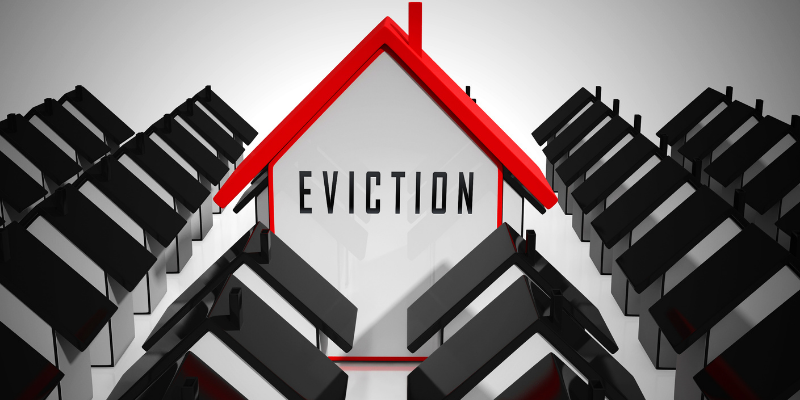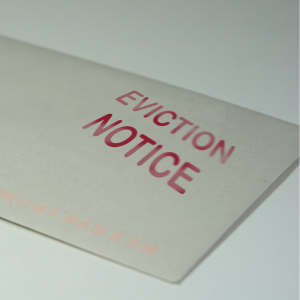
Understanding the Eviction Process: A Comprehensive Guide
Understanding the eviction process in St. Paul, MN, is crucial for both landlords and tenants to navigate legal responsibilities and rights effectively.
The eviction timeline begins with a notice to vacate, which must comply with Minnesota’s landlord-tenant laws concerning proper duration and reason. Common grounds for eviction include non-payment of rent or lease violations.
Once the notice period lapses without resolution, landlords can file an eviction action in Ramsey County Housing Court. Both parties should prepare for the initial court hearing by gathering relevant documentation, such as lease agreements and communication records.
K&G Investments can help both landlords and tenants understand their rights and prepare appropriately during this process. Contact us today to learn more. Tenants have the right to contest the eviction if they believe it lacks merit or if there are claims of habitability issues that were not addressed by the landlord. If the court rules in favor of eviction, tenants typically receive a writ of recovery, granting them a limited time to vacate the premises voluntarily before law enforcement steps in to enforce removal.
Understanding each step of this process helps ensure that both landlords and tenants act within their legal rights and obligations while minimizing conflict and potential financial loss.
Legal Grounds for Eviction: Common Reasons Landlords Pursue Evictions
In St. Paul, MN, understanding the legal grounds for eviction is crucial for both landlords and tenants navigating the eviction timeline.
Landlords commonly pursue evictions for several reasons that align with Minnesota’s legal standards. Non-payment of rent is a primary cause, where tenants fail to meet their rental obligations despite notices and grace periods.
Lease violations also serve as significant grounds for eviction, which can include unauthorized subletting, housing unauthorized occupants, or violating pet policies stipulated in the lease agreement. Property damage beyond normal wear and tear may prompt landlords to initiate eviction proceedings if tenants are responsible for significant destruction or neglect of the rental unit.
Engaging in illegal activities on the premises, such as drug-related offenses or other criminal behavior, provides landlords with legitimate reasons to seek an eviction under Minnesota law. Additionally, overstaying a lease term without renewal can lead to eviction actions when tenants remain in the property after their lease has expired and no new agreement has been formed.
Understanding these common reasons helps landlords enforce their rights while ensuring tenants are aware of behaviors that could jeopardize their tenancy in St. Paul.
Tenant Rights During Eviction Proceedings: What You Need to Know
In St. Paul, Minnesota, tenants have specific rights during eviction proceedings that are crucial to understanding.
Firstly, landlords must provide a valid reason for eviction, such as non-payment of rent or lease violations, and follow the proper legal process by serving a written notice. Tenants have the right to contest an eviction in court and are entitled to receive a formal summons and complaint outlining the landlord’s claims.
During this process, tenants can present their case, potentially arguing defenses like improper notice or retaliation. Importantly, tenants in St. Paul cannot be forcibly removed from their homes without a court order; only a sheriff can execute an eviction after the court has ruled in favor of the landlord. Additionally, Minnesota law prohibits landlords from engaging in self-help evictions by changing locks or shutting off utilities.
Understanding these rights is essential for tenants to protect themselves throughout the eviction timeline and ensure fair treatment under local housing laws.
Landlord Responsibilities in the Eviction Process
In St. Paul, MN, landlords have specific responsibilities during the eviction process to ensure compliance with local laws and protect the rights of both parties involved.
Initially, landlords must provide tenants with proper notice, which typically includes a written demand for rent payment or a notice to correct lease violations. This notice must adhere to the timeframe dictated by Minnesota law, ensuring tenants have an adequate opportunity to address the issue.
If a tenant fails to comply within this period, landlords can proceed by filing an eviction action in the district court. It’s essential for landlords to prepare all necessary documentation accurately and present evidence that supports their claim in court, such as lease agreements and records of communication with the tenant.
Moreover, landlords are required to follow all procedural rules set forth by Minnesota statutes during the eviction hearing. Should an eviction order be granted, only authorized personnel like county sheriffs can enforce it; landlords cannot take matters into their own hands by removing tenants or changing locks without legal authority.
By diligently following these responsibilities, landlords help ensure a fair and lawful eviction process while maintaining respect for tenant rights under St. Paul’s jurisdiction.
Key Steps in the Eviction Timeline: What to Expect
Understanding the eviction timeline in St. Paul, MN, is crucial for both landlords and tenants to navigate the process effectively.
The first step in this legal procedure is serving a written notice, which must comply with Minnesota state laws regarding the specific grounds for eviction, such as non-payment of rent or lease violations. After delivering the notice, if tenants fail to comply within the stipulated period, landlords can file an eviction action in court.
This initiates a formal court process where tenants receive a summons and complaint outlining the reasons for eviction. It’s essential for tenants to respond promptly to avoid default judgments.
The court then schedules a hearing where both parties present their cases. If the court rules in favor of the landlord, it issues a writ of recovery, allowing law enforcement to enforce removal should tenants not vacate voluntarily by the deadline specified in the judgment.
Throughout each step of this timeline, adhering strictly to legal requirements is critical to ensure due process and uphold rights under Minnesota law. Both landlords and tenants benefit from understanding these steps fully to protect their interests effectively during an eviction proceeding.
How Long Does an Eviction Take? Timelines and Variations by State
In St. Paul, Minnesota, understanding the eviction timeline is crucial for both landlords and tenants due to the specific procedures and legal requirements involved. Generally, an eviction process in St.

Paul can take anywhere from several weeks to a few months, depending on various factors such as court availability and tenant response time. Initially, the landlord must provide the tenant with a written notice to vacate, which typically grants the tenant 14 days to address any lease violations or move out. If the tenant fails to comply, the landlord can then file an eviction lawsuit in court.
The scheduling of a court hearing may vary based on local caseloads but usually occurs within two to three weeks after filing. Following a court ruling in favor of the landlord, if the tenant still refuses to leave, a writ of recovery is issued by the court allowing local authorities to enforce removal; this step might add another week or two depending on sheriff scheduling. These timelines can differ from those in other states due to Minnesota’s unique laws and judicial processes governing evictions.
Understanding these nuances is essential for managing expectations and preparing adequately for each stage of the eviction process in St. Paul.
Impact of Local Laws on Eviction Timelines and Procedures
In the case of St. Paul, Minnesota, local regulations have a notable impact on the eviction timelines and processes that both stakeholders have to follow.
The regulations intend to provide a balanced approach for every participant in the eviction dispute. St. Paul-specific laws can further stretch the time frame within which eviction can take place, thus giving the tenants a fairer chance to resolve all concerns before the court order is acted upon. For example, eviction is preceded by a notice that must specify the grounds for the eviction and may include failure to pay rent or breach of contract.
In some cases, additional timelines may be imposed, for instance, on disputes within the rental premises or even claims that the landlord could be discriminating against the tenants. Such local laws are aimed at ensuring that tenant rights are upheld, even as the landlord’s rights are considered, to reduce the risk of the landlord failing to adhere to requirements and provide the needed information to the tenants during the eviction process.
The intersection of state and local laws makes the situation in St. Paul different and makes it necessary for both the tenants and the landlords to have the requisite knowledge to adequately deal with or adequately execute their processes in eviction proceedings.
Court Procedures in Eviction Cases
In St. Paul, MN, understanding court procedures in an eviction case requires both landlords and tenants to know particular critical steps and deadlines.
After an eviction complaint is filed, the court books a hearing in about 10 to 14 days. It is important for both sides to bring to the hearing all the documents together, including contracts, rentals, payment history, and all communication pertaining to the matter.
In Minnesota, tenants have the right to challenge the eviction, especially if it is unfair or retaliatory. It is important for landlords to have their documents in order and to avoid failures and legal gaps in their issues so that the case proceeds.
Legal counsel is invaluable to both sides in issues dealing with the habitability or breach of lease terms. On the hearing day, both sides need to arrive on time and be prepared because, like the rest of the court, their time is limited.
The above procedures apply in the case of arrears in rent payment and eviction. Understanding all these procedures enables both sides to effectively advocate and help manage expectations in a case of eviction.
Eviction Hearing Preparation: Critical Steps for All Involved
In the case of an eviction hearing, both landlords and tenants must prepare for one in considerable detail, and in St. Paul, MN, the process details have to be understood by both parties.
Landlords must provide the appropriate documents, such as the lease agreement, payment records, and any relevant files, to prepare for the hearing. In Minnesota, complying with the eviction notice law is a must, as failing to do so will only complicate the process and add more delay.
As for the tenants, it is just as crucial to gather documents as proof of rent payments and any correspondence pertaining to repairs or disputes with the landlord, among other relevant files. It cannot be overemphasized how succinct and structured the presentation of the case must be for both parties before the judge for the best outcome.
There is a wealth of local resources and legal counselors that can provide guidance on understanding the rights and responsibilities under Minnesota law, so it is best to utilize them. A step that can have a positive impact on the outcome of the hearing is arriving in the expected courthouse on time and in proper dress so that it cannot be delayed.
It is essential to understand that the evaluation of the case must be approached in the right manner so that the best outcome can be reached, and this is beneficial for both parties regardless of defending or facing eviction.
Building a Strong Case as a Landlord or Tenant in Court
When navigating the eviction timeline in St. Paul, MN, building a strong case as either a landlord or tenant in court is crucial for achieving a favorable outcome.
For landlords, it is essential to meticulously document all interactions with tenants, including lease agreements, payment records, and any notices served regarding late rent or lease violations. This documentation serves as critical evidence to support claims of non-compliance or breach of contract.
On the other hand, tenants should gather evidence that demonstrates adherence to the lease terms and any proof of payments made. Tenants can also collect records of communication with the landlord regarding maintenance requests or disputes over property conditions.
Both parties should familiarize themselves with Minnesota’s specific landlord-tenant laws to ensure their actions are compliant and justified under local regulations. Understanding legal rights and obligations can greatly enhance each party’s ability to present a compelling argument in court.
We buy houses in St. Paul and nearby cities, which can be a solution for landlords seeking to sell rental properties affected by prolonged legal disputes or ongoing tenant issues. Seeking assistance from legal professionals who specialize in housing law may provide valuable insights into effectively navigating the complexities of eviction proceedings in St. Paul.
The Role of Mediation and Negotiation in Avoiding Evictions
Mediation and negotiation play a crucial role in avoiding evictions in St. Paul, MN, by facilitating open communication between landlords and tenants.
These processes offer a structured environment where both parties can express concerns and explore mutually beneficial solutions without the adversarial nature of court proceedings. Mediation allows for the involvement of a neutral third party to guide discussions and help resolve disputes over issues such as late rent payments or lease violations.
This approach can lead to agreements that prevent eviction by arranging feasible payment plans or modifying lease terms to accommodate both the tenant’s needs and the landlord’s expectations. Negotiation empowers landlords and tenants to address conflicts directly, encouraging collaboration and compromise before situations escalate to eviction filings.
By prioritizing mediation and negotiation, stakeholders can save time, reduce legal costs, and maintain stable housing arrangements, ultimately fostering a more cooperative rental market in St. Paul.
Tips for Tenants Facing Eviction: Resources and Strategies
Tenants facing eviction in St. Paul, MN, can take several proactive steps and utilize available resources to navigate this challenging situation.

It’s crucial for tenants to first understand their rights under Minnesota law and review the specific details of their lease agreements. Seeking assistance from organizations such as HOME Line or Southern Minnesota Regional Legal Services can provide valuable legal advice and support.
Tenants should communicate openly with their landlords to try to negotiate potential solutions, such as payment plans or temporary rent reductions. Attending any scheduled court hearings is essential, as missing them could result in an unfavorable judgment by default.
Exploring rental assistance programs offered by local government agencies or nonprofits can also help alleviate financial burdens. Being informed about the eviction timeline and actively seeking mediation services may increase the chances of a favorable outcome while maintaining housing stability during difficult times.
Emergency Rental Assistance Programs to Prevent Tenant Displacement
Navigating the eviction timeline in St. Paul, MN, can be challenging for both landlords and tenants, but understanding available emergency rental assistance programs is crucial to preventing tenant displacement.
These programs aim to offer financial relief to tenants who are struggling to meet their rent obligations due to unforeseen circumstances like job loss or medical emergencies. By providing funds directly to landlords on behalf of tenants, these initiatives help maintain housing stability.
In St. Paul, several local and state resources are available that can quickly intervene during the eviction process, assisting both parties in finding a resolution before legal actions escalate.
It’s essential for landlords and tenants alike to stay informed about eligibility criteria and application processes for these rental assistance programs, as they can play a pivotal role in safeguarding housing security amidst financial hardship. This proactive approach not only aids tenants in retaining their homes but also ensures landlords continue receiving rental income without interruption.
Exploring Alternatives to Traditional Evictions for Landlords
In St. Paul, MN, landlords looking for alternatives to traditional evictions can consider methods that focus on keeping the tenants longer while also reducing the rent loss.
Landlords and tenants can resolve differences using mediation services, which allow for effective communication. Landlords can make use of cash-for-keys agreements, where the tenants are paid some amount to leave the premises, which saves on the costs associated with an eviction.
Landlords have the option of creating different ways to allow tenants to pay their rent, such as flexible payment schedules that allow tenants to pay rent over time without the threat of losing their tenancy. Landlords can also cooperate with local housing agencies to utilize the programs that ensure tenants are able to pay their rent on time but also help the landlords to receive the payment without default.
In St. Paul, landlords can adopt methods such as these to help improve their rental business while promoting enhanced relations with the tenants and helping improve the stability of the community.
Financial Implications of an Eviction for Landlords and Tenants
Both landlords and tenants are equally affected by an eviction in St. Paul, MN, and thus, its financial implications need to be well understood by both parties.
Eviction brings financial implications for landlords due to each unit having an opportunity cost for vacant periods. Additionally, legal expenses for eviction filings and court appearances add to the financial burden. Moreover, having to pay for property repairs to bring the unit to a rent-ready state due to tenant damage increases the financial burden.
On the other hand, tenants look to mitigate the financial burden of losing a security deposit and having to pay for new housing. Other costs include a damaged credit score, which hinders securing rental agreements, as well as higher costs in the form of enhanced security deposits and rent.
It is important for both parties to lessen their financial implications by trying to mitigate their economic burdens during an eviction process.
Dealing with Property Damage and Unpaid Rent Issues Post-Tenant Removal
In St. Paul, MN, landlords must legally regulate unpaid rent and property damage issues after tenant removal to minimize costs and effectively manage the property.
Landlords need to deal with the property and damage assessments post tenant removal. It is important to do a meticulous assessment of the property for damage beyond the normal wear and tear, including taking photos and notes of the details. This would help in any claims that arise in the security deposit and small claims court.
In every property, there is bound to be unpaid rent and breach of terms and conditions, so every landlord has to deal with the violation of terms and the unpaid rent by the tenant till the date of eviction. This typically begins with a formal demand letter to the accused.
In resolving the issues where there is defaulted rent and the claim of damages, there is a need to resolve the issues in a timely manner, where the continuity of the eviction process is executed while being in touch with the landlord-tenant lawyer who is well-versed with Minnesota laws.
Filing an Appeal Against an Unfavorable Eviction Judgment
In St. Paul, MN, landlords and tenants both have the right to appeal an unfavorable eviction judgment. This appeal is crucial for upholding their rights and interests. Knowing the legal basis for appeal is the first step in the process.
Appealing an eviction judgment requires thoroughly remediating the court’s judgment for any improper procedures and legal ambiguities that constitute the appeal. Every state has its deadlines for filing an appeal, and in Minnesota, the appeal window is restrictive and is usually a few days.
Both landlords and tenants need to extract and document relevant lease agreements, served notices, and evidence from the original trial to present a stronger case. With the intricate nature of eviction law in Minnesota, an attorney can help navigate the process and build a detailed case to overturn the unjust ruling. Other than mediation, some local courts may direct parties to pursue mediation to help resolve issues without further escalation to the appellate court.
Comprehending these tasks and requirements is essential to successfully contending with an eviction judgment in St. Paul’s legal framework.
The Importance of Fair Housing Laws in the Prevention of Illegal Evictions
Fair housing legislation provides protections for tenants against illegal evictions in St. Paul, MN, so that both landlords and tenants are aware of their rights and obligations.

Landlords can easily get into legal trouble if they ignore housing laws. Fair housing laws not only help avoid legal trouble but also ensure that all tenants are treated fairly and equally.
In St. Paul, like other cities, the Fair Housing Act has been the backbone of the law that ensures no tenant is evicted arbitrarily. It also ensures that tenants are only evicted for valid reasons, such as for not paying rent or breaching the lease.
The law provides means for tenants to bring legal actions if they feel they are being unlawfully evicted. There are also local laws and state laws that govern eviction processes that require landlords to serve appropriate notices to alert tenants before commencing eviction procedures.
Landlords in St. Paul, as much as their tenants, need to know the laws so as to conduct their businesses in a moral and socially acceptable manner. Housing law is there to protect both tenants and landlords.
How Long Does It Take to Get Evicted in Minnesota?
In Minnesota, the eviction process for landlords and tenants in St. Paul generally unfolds over several key stages, each with specific timelines. Understanding these steps is crucial for both parties involved.
First, a landlord must provide a written notice to the tenant, typically allowing a reasonable period to remedy any lease violations or pay overdue rent. If the tenant does not comply within this timeframe, the landlord can then file an eviction action in court. The scheduling of the court hearing usually occurs within two weeks of filing, depending on the county’s caseload.
After the court hearing, if the judge rules in favor of the landlord, a writ of recovery is issued, granting legal permission to reclaim possession of the property. This writ may be enforced by law enforcement after 24 hours’ notice to vacate is given to the tenant. Overall, while timelines can vary based on specific circumstances and court schedules in St. Paul and throughout Minnesota, an uncontested eviction might take anywhere from three to six weeks from start to finish.
However, contested evictions or those involving appeals can extend significantly longer. We buy houses in Minnesota and nearby cities, which may help landlords sell occupied or recently vacated properties quickly. Understanding these timelines helps landlords and tenants prepare better for each phase of the eviction process in Minnesota.
What Is the Minimum Time for an Eviction Notice?
In the case of St. Paul, MN, adhering to the regulations in the eviction timeline as a tenant or a landlord is of utmost importance. Eviction Notice is split into multiple sub-definitions, like “notice to quit” or “notice to vacate,” and has a minimum time limit.
A landlord will have to send a two-week notice period for any of his tenants’ failure to pay rent. This means there is going to be a window wherein tenants can either pay up rent or leave the property to prevent legal escalation. Apart from this legal notice, a tenant also has the option of leaving the property in case he or she has no other options available. If a landlord issues an eviction notice for St. Paul, this 14-day window is non-negotiable.
In any case, tenants are not devoid of rights in the case of an eviction and have the ability to contest the case. Document all relevant data and seek specialized legal advice if required in order to deal with the convoluted system.
St. Paul tenants and landlords are able to reduce disputes and maintain order with the help of understanding legal frameworks and timelines.
What Is New in Minnesota Eviction Law?
In Minnesota, the recent changes to the eviction law have, in particular, impacted the eviction process in St. Paul.
For both landlords and tenants, knowing these updates is beneficial, keeping in mind the comprehensive notice process and the comprehensive changes to the law, which have restrictions on issuing eviction notices in a much more thorough fashion.
Landlords have to issue to the tenants a notice that details the reason for eviction in the letter and the remedies available to the eviction, if any. Further, tenants can now respond to eviction notices in a much longer time frame, resulting in more time available to the tenants to follow the legal process or fix the process that is in breach of the lease.
The changes are aimed at moderation in St. Paul and the whole of Minnesota, trying to ensure fairness in housing so that the rules in favor of the landlords do not overshadow the rights of the tenants, and thus, trying to ensure that the housing systems are not discriminatory.
The landlords and tenants both need to understand these legal changes deeply to make the eviction process smooth and to ensure that they do not fall into the traps that can result in avoiding the city, which is in Minnesota.
How Far Behind in Rent Before Eviction in Minnesota?
For both tenants and landlords in Minnesota, it is important to know the eviction timeline, especially when it comes to rent payment defaults. Like the rest of Minnesota, in St. Paul, there is no specific law on how in arrears a tenant has to be for eviction to be processed. However, eviction actions are often triggered when rent is overdue.
Tenants should note that the moment they skip a rental payment, they are considered to be in breach of their contract. A landlord can issue a pay rent or quit notice, which allows tenants to pay the overdue amount and not get evicted.
The period for such a notice may differ but often demands instant compliance from the tenant. Knowing these timeframes enables both sides to operate within the law and in good faith, minimizing the likelihood of escalated landlord and tenant conflicts in St. Paul and other places.
Do you need to sell your home? Sell quickly, avoid costly repairs, or prefer a hassle-free sale. K&G Investments is here to help. We offer fair cash offers, handle all the details, and make the process seamless. Ready to sell or have questions? Call us at (612) 400-8070 for a no-obligation offer. Get started today!
Helpful St. Paul Blog Articles
- How To Successfully Sell Half Of Your St. Paul, MN, Home
- Maximize Your Home Sale In St. Paul, MN
- Selling Your St. Paul, MN, Home Amidst A Pending Lawsuit
- How To Sell Your House And Still Live In It: A Guide For St. Paul, MN
- How To Successfully Sell Half Of A Duplex In St. Paul, MN
- Eviction Timeline In St. Paul, MN: A Guide For Landlords And Tenants
- Understanding Tax Responsibilities When Selling A Home In St. Paul, MN
- Understanding The Timeframe To Sell A House In St. Paul, MN
- Effective Strategies For Selling A Flood-damaged House In St. Paul, MN
- Selling Your St. Paul, MN, Home After 3 Years Without A Realtor

| RENTAL HOUSING | LANDLORD AND TENANT | EVICTING | RENTER | RENTING | STATE OF MINNESOTA |
| SUBLEASING | COURT SUMMONS | POLICE REPORT | ATTORNEYS | LAWYERS | STATUTORY |
| DEFENDANT | EXPUNGING | EXPUNGEMENT | PLAINTIFF | FORECLOSED | FORECLOSURE |
| MORTGAGE FORECLOSURE | CRIMES | DEED | DAMAGES | ACTUAL DAMAGES | TAX |
| TAXES | MONEY | REFEREE | INBOX | EMAILS | AFFIDAVIT |
| PROPERTY TAX | PROPERTY TAXES | LEGAL AID | CIVIL ACTIONS | INVENTORY | GOOD FAITH |
| FAILURE | DETAINER | ATTORNEYS’ FEES | ATTORNEY FEES | SMOKING | PROCESS SERVERS |
| SERVICE OF PROCESS | NUISANCE | LAW ENFORCEMENT OFFICER | LAW ENFORCEMENT OFFICER | LAW ENFORCEMENT | HENNEPIN COUNTY |
| HENNEPIN | HEAT | HEAT SOURCE | ESCROW | APARTMENT | APARTMENT BUILDINGS |
| WITNESS | VIOLENCE | TELEPHONE | SIGNATURE | RECEIPTS | POLICE OFFICER |
| PETS | MINNESOTA LEGISLATURE | TWIN CITIES | THE TWIN CITIES | FIRST CLASS MAIL | |
| LIEN | INJURY | HOLIDAY | MINNESOTA DISTRICT COURT | ASSAULT | ACCOUNTING |
| TO EVICT A | THE EVICTION ACTION | OF THE LEASE | THE TENANT HAS | FROM THE PREMISES | WITH THE COURT |
| LANDLORD AND TENANT | BEFORE THE COURT | IF THE TENANT IS | FIRST-CLASS MAIL | THE TENANT HAS NOT | TO EVICT A TENANT |
| PROPERTY FROM THE PREMISES | IF THE TENANT HAS | DAYS BEFORE THE COURT |
